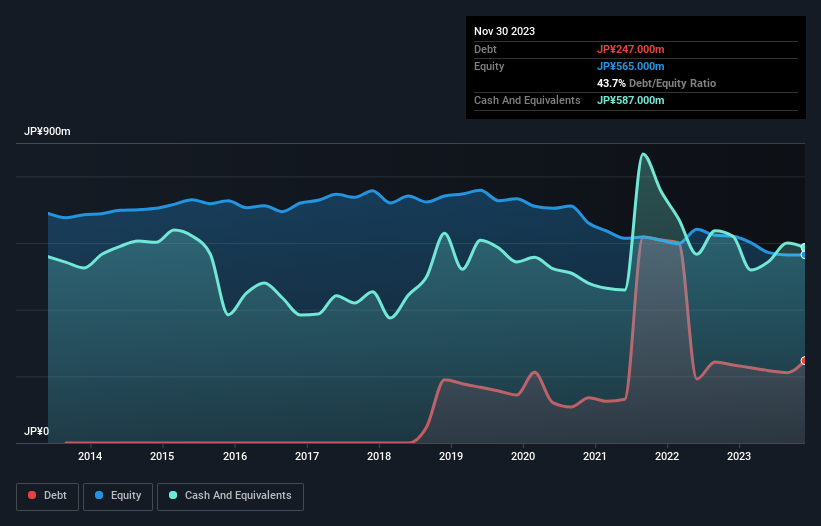
Legendary fund manager Li Lu (who Charlie Munger backed) once said, 'The biggest investment risk is not the volatility of prices, but whether you will suffer a permanent loss of capital.' So it seems the smart money knows that debt - which is usually involved in bankruptcies - is a very important factor, when you assess how risky a company is. We note that AUN CONSULTING, Inc. (TSE:2459) does have debt on its balance sheet. But the real question is whether this debt is making the company risky.
When Is Debt A Problem?
Generally speaking, debt only becomes a real problem when a company can't easily pay it off, either by raising capital or with its own cash flow. Part and parcel of capitalism is the process of 'creative destruction' where failed businesses are mercilessly liquidated by their bankers. However, a more common (but still painful) scenario is that it has to raise new equity capital at a low price, thus permanently diluting shareholders. Of course, plenty of companies use debt to fund growth, without any negative consequences. When we examine debt levels, we first consider both cash and debt levels, together.
Check out our latest analysis for AUN CONSULTING
What Is AUN CONSULTING's Debt?
As you can see below, at the end of November 2023, AUN CONSULTING had JP¥247.0m of debt, up from JP¥234.0m a year ago. Click the image for more detail. But it also has JP¥587.0m in cash to offset that, meaning it has JP¥340.0m net cash.

A Look At AUN CONSULTING's Liabilities
According to the last reported balance sheet, AUN CONSULTING had liabilities of JP¥232.0m due within 12 months, and liabilities of JP¥253.0m due beyond 12 months. Offsetting these obligations, it had cash of JP¥587.0m as well as receivables valued at JP¥169.0m due within 12 months. So it can boast JP¥271.0m more liquid assets than total liabilities.
This surplus suggests that AUN CONSULTING is using debt in a way that is appears to be both safe and conservative. Because it has plenty of assets, it is unlikely to have trouble with its lenders. Simply put, the fact that AUN CONSULTING has more cash than debt is arguably a good indication that it can manage its debt safely. When analysing debt levels, the balance sheet is the obvious place to start. But it is AUN CONSULTING's earnings that will influence how the balance sheet holds up in the future. So when considering debt, it's definitely worth looking at the earnings trend. Click here for an interactive snapshot.
Over 12 months, AUN CONSULTING saw its revenue hold pretty steady, and it did not report positive earnings before interest and tax. While that's not too bad, we'd prefer see growth.
So How Risky Is AUN CONSULTING?
By their very nature companies that are losing money are more risky than those with a long history of profitability. And the fact is that over the last twelve months AUN CONSULTING lost money at the earnings before interest and tax (EBIT) line. Indeed, in that time it burnt through JP¥100m of cash and made a loss of JP¥63m. But the saving grace is the JP¥340.0m on the balance sheet. That means it could keep spending at its current rate for more than two years. Even though its balance sheet seems sufficiently liquid, debt always makes us a little nervous if a company doesn't produce free cash flow regularly. The balance sheet is clearly the area to focus on when you are analysing debt. But ultimately, every company can contain risks that exist outside of the balance sheet. For example, we've discovered 4 warning signs for AUN CONSULTING (2 make us uncomfortable!) that you should be aware of before investing here.
When all is said and done, sometimes its easier to focus on companies that don't even need debt. Readers can access a list of growth stocks with zero net debt 100% free, right now.
New: Manage All Your Stock Portfolios in One Place
We've created the ultimate portfolio companion for stock investors, and it's free.
• Connect an unlimited number of Portfolios and see your total in one currency
• Be alerted to new Warning Signs or Risks via email or mobile
• Track the Fair Value of your stocks
Have feedback on this article? Concerned about the content? Get in touch with us directly. Alternatively, email editorial-team (at) simplywallst.com.
This article by Simply Wall St is general in nature. We provide commentary based on historical data and analyst forecasts only using an unbiased methodology and our articles are not intended to be financial advice. It does not constitute a recommendation to buy or sell any stock, and does not take account of your objectives, or your financial situation. We aim to bring you long-term focused analysis driven by fundamental data. Note that our analysis may not factor in the latest price-sensitive company announcements or qualitative material. Simply Wall St has no position in any stocks mentioned.
About TSE:2459
AUN CONSULTING
Provides marketing support services in Japan and internationally.
Excellent balance sheet slight.
Market Insights
Community Narratives


